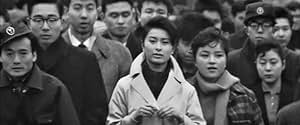Chieko Baishô's parents are seaweed farmers. Their crops are being destroyed by the rising pollution in the industrial city. She and her sister, Noriko Maki, work for the big factory that is destroying their parents' business, taking home less than ten thousand yen a month -- about $30. Their parents can't make ends meet. Not only do the girls pay rent, but their mother keeps 'borrowing a thousand yen to pay the bills as they come in.
Miss Baishô has reached the marriageable age, and suddenly is confronted wth three suitors. One is the unseen son of their father's union chief. That marriage would make things a lot better for her family. Another is a visitor who turns out to be a childhood friend. Back then he was a black marketeer; now he is a salaryman for the same company she works for, earning a handsome 30,000 yen a month. The third is a laborer at the factory. He earns 17,000 yen a month. She seems to favor the third, but fears the poverty she has known all her life.
In the US, of course, this would have been a comedy, like TOM, DICK AND HARRY, with Ginger Rogers playing an amiable ditz. In Masahiro Shinoda's movie, however, it's a serious drama. In a Japan, coming out of the poverty of the postwar period, and with the newfound prosperity unevenly divided, it is a serious issue: can true love win out over security?























